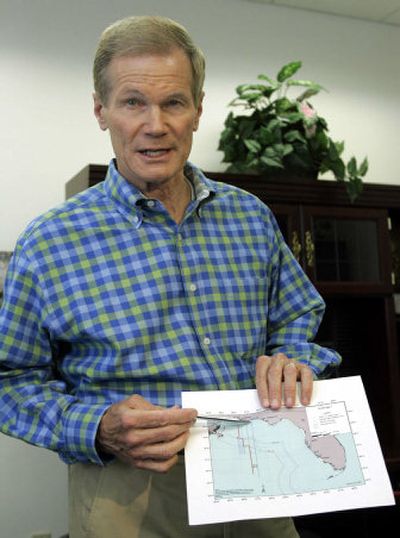Senate plan calls for more drilling in Gulf of Mexico

WASHINGTON – Hailing it as a historic deal, Senate leaders announced Wednesday a plan to open a wide swath of the Gulf of Mexico to oil and gas drilling.
The proposal would limit new offshore development to the gulf, keeping oil and gas rigs as far as 235 miles off Florida’s Gulf Coast along Tampa and Naples and no closer than 125 miles off the Florida Panhandle. The protections would expire in 2022.
The House of Representatives’ main drilling champion, Rep. Richard Pombo, R-Calif., welcomed the Senate action as a move “in the right direction,” but he noted that the House legislation would affect more of the U.S. coastline.
“Depending on exactly what it is they do, I don’t think they are that much different on the eastern gulf stuff from what we are,” Pombo said.
“The only question then is, how do we deal with the rest of the country, because if it is good enough to protect Florida, why isn’t it good enough to protect California?”
The proposal, hammered out after months of negotiations, was unveiled with fanfare at the Capitol by Senate Majority Leader Bill Frist, R-Tenn., and a bipartisan group that included Florida Republican Sen. Mel Martinez. Martinez was part of the closed-door deal-making and pronounced himself “thrilled and delighted” with the compromise.
The plan drew a more tempered response from his Democratic counterpart, Florida Sen. Bill Nelson. Nelson called the compromise “very promising,” but said he wanted to see the details in writing.
Nelson, who along with Martinez has pushed for a 150-mile buffer, said he’d be more inclined to support the measure if Senate leaders can ensure that it will be embraced by the House.
Two weeks ago, the House passed sweeping legislation that would open up much of the Outer Continental Shelf to drilling as close as 50 miles to shore. Lawmakers from coastal states have long opposed offshore drilling, contending that one spill or pollution from drilling operations could mar coastlines and threaten tourism.
But the House bill would be unlikely to pass in the Senate, paving the way for yet more negotiations between the two chambers as the clock on the legislative session winds down.
Lead negotiator Sen. Pete Domenici, R-N.M., estimated that the Senate proposal would yield more than 5 trillion cubic feet of natural gas, “enough to make sure all the homes in Florida have enough natural gas for 10 years.”
Florida’s congressional delegation for months has been fending off aggressive efforts to open the Gulf of Mexico to energy exploration. Pressure has increased recently with rising gas prices and lawmakers eager to show voters in November that they’ve addressed the issue.
The Senate bill has the backing of most of the energy-producing Gulf States, which held out for a provision that would give them a share of the revenues generated by new lease sales and production royalties.
Sen. Jeff Sessions, R-Ala., noted he’d recently gone fishing near an oil rig off the Alabama shore and “not one drop of oil was on the water.”
But environmentalists decried the compromise, warning that it gives the House the opportunity to push in conference meetings for broader access. They argued that the country would be better off promoting energy conservation.
“Any offshore drilling bill is a step in the wrong direction,” said Athan Manuel of the Sierra Club.